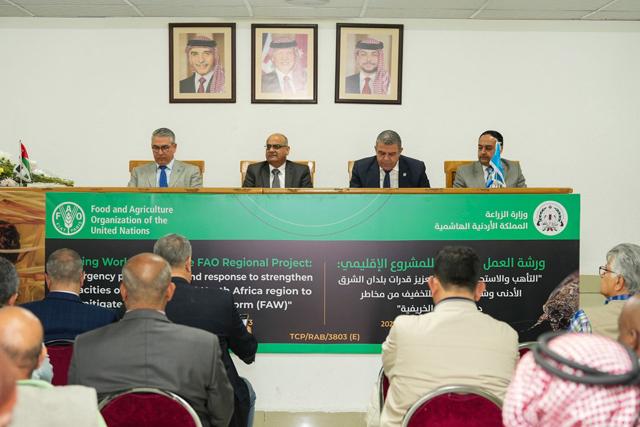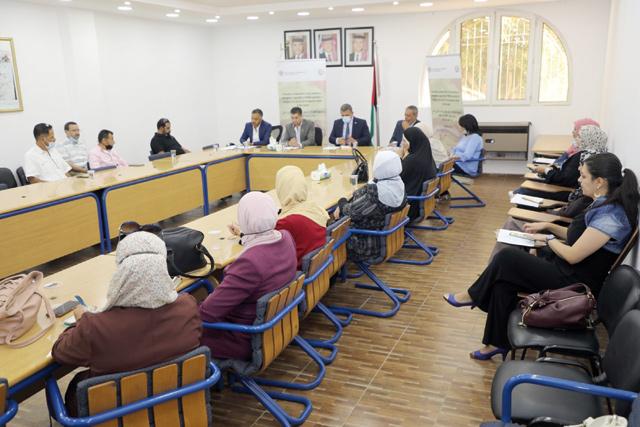You are here
FAO holds closing workshop for regional project to mitigate risks of Fall Armyworm
By JT - Mar 13,2023 - Last updated at Mar 13,2023

Speakers during the closing workshop of the regional project ‘Emergency Preparedness and Response to Strengthen the Capacities of Near East and North African Countries to Mitigate the Risks of Fall Armyworm’ organised by the Food and Agriculture Organisation of the United Nations in Amman (Photo courtesy of FAO)
AMMAN — The Food and Agriculture Organisation of the United Nations (FAO) held the closing workshop of the regional project "Emergency Preparedness and Response to Strengthen the Capacities of Near East and North African (NENA) Countries to Mitigate the Risks of Fall Armyworm (FAW)" from March 13 to 14 in Amman with the presence of representatives of the ministries of agriculture in the countries participating in the project.
The workshop reviewed the risks of FAW and the efforts of FAO to mitigate the risks of FAW which attacks crops like corn, rice, sorghum, millet, sugar cane, vegetable crops and cotton, according to a FAO statement.
Moreover, the workshop discussed the implementation of FAW integrated control strategy in the NENA region, in particular in Jordan, Lebanon, Syria, the West Bank and the Gaza Strip, in addition to discussing the final report of the project, which included achievements, success stories, lessons learned and challenges and recommendations, the statement said.
“The outputs of this workshop will provide regional guidance and recommendations on reducing the spread of FAW and measures to control it,” said Nabil Assaf, FAO Representative in Jordan.
“The workshop aims to encourage the exchange of information among countries in the NENA region on the integrated techniques and technologies to control FAW, as well as to learn about the progress made in the implementation of the project in Jordan, Lebanon, Palestine, Syria, and to collect suggestions for the way forward in FAO Global Action to combat this pest,” Assaf added.
The workshop also included a panel discussion on the Farmers Field Schools that were implemented in Jordan in the regions of Deir Alla, the southern Shouneh, and the southern Jordan Valley, in addition to a field visit to a model farm and the inauguration ofa new laboratory for the production of natural enemies.
“FAW is one of the most dangerous pests that attacks many economically important crops, as it can feed on more than 80 plant species,” explained Thaer Yaseen, Regional Plant Protection Officer at the Regional Office of the Food and Agriculture Organisation of the United Nations in the Near East and North Africa.
“The pest was able, during the last four years, to move between different countries and infect crops in 79 countries in Africa, Asia, and the Pacific, while the pest was reported in 12 of the 19 countries of the NENA region,” Yaseen added.
Yaseen stated that FAO is always rushing to help local governments and small farmers in countries affected by the presence of emerging pests, and in the case of FAW, the organisation has prepared and approved a technical cooperation project to support regional and local capacities to monitor and control FAW in Jordan, Lebanon, Palestine and Syria as soon as the ministries of agriculture in those countries requested the support of the organisation.
"We are fully aware of the importance of true partnership between the public sector and international organisations such as FAO in advancing the status of the agricultural sector. Moreover, we are aware of the organisation's efforts through projects at the local and the regional level in supporting the efforts of the Ministry of Agriculture in applying integrated control programmes for agricultural pests by providing the latest methods in the field of control through the use of local and regional experts, as well as the use of agricultural pesticides that have the best effect in control and are safe to use on farmers and agricultural products,” explained Ayman Al Oran, Assistant Secretary-General of the Plant Resources, on behalf of Agriculture Minister Khalid Hneifat.
The FAW Technical Cooperation Programme project was launched through a virtual workshop to support the authorities of the participating countries to mitigate the risks of FAW in February 2021, in the presence of stakeholders, partners, decision-makers from the public and private sectors, local and international organisations, as well as experts and researchers.
Related Articles
AMMAN — The Food and Agriculture Organisation (FAO) of the United Nations completed the first day of the Farmer Field School (FFS) training
AMMAN — The Food and Agriculture Organisation (FAO) of the United Nations conducted a training programme on integrated pest management for f
AMMAN — The Food and Agriculture Organisation, part of the United Nations, on Monday launched the Farmer Field School (FFS) training on Inte













